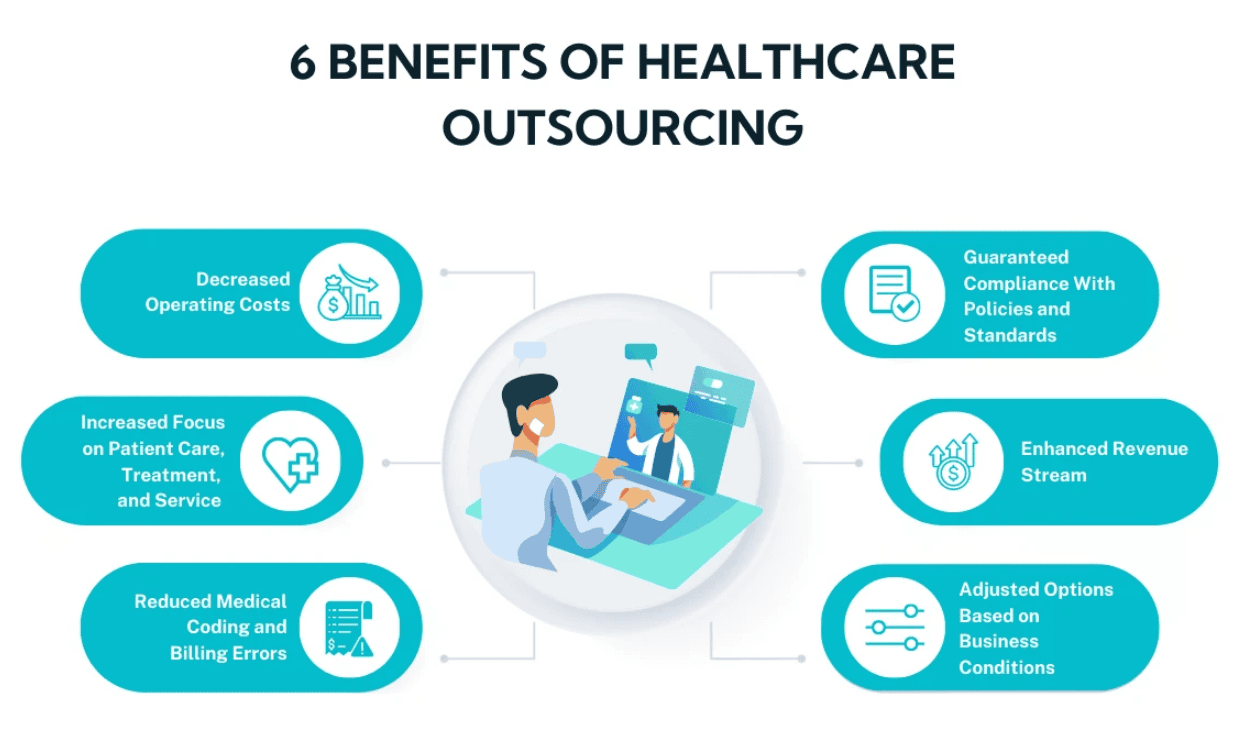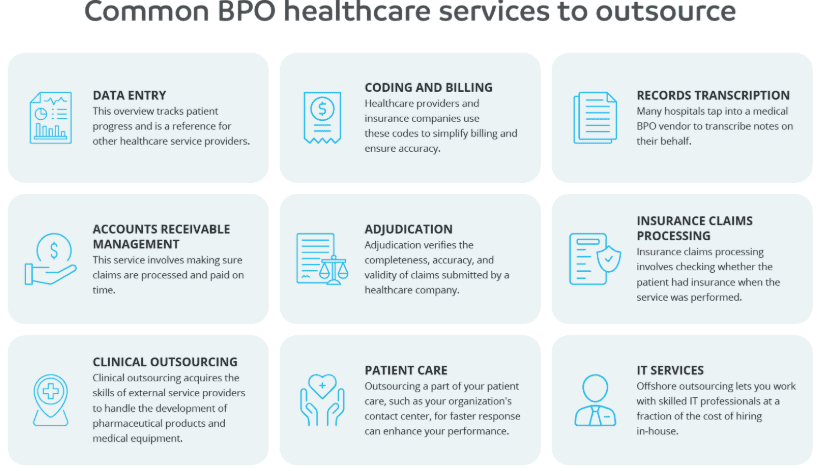The healthcare sector in the United States is facing a convergence of mounting challenges—from rising operational costs and regulatory burdens to growing patient demands and staffing shortages. Amidst this complex landscape, healthcare outsourcing has become a strategic necessity for organizations aiming to deliver high-quality patient care while maintaining financial sustainability. Outsourcing allows healthcare providers to delegate non-core and even some clinical tasks to third-party specialists, ensuring operational excellence, compliance, and better patient outcomes. This guide provides an in-depth exploration of the healthcare roles most commonly outsourced, the core benefits of outsourcing, the most important aspects of managing outsourced functions, and future trends that will shape the healthcare outsourcing space in the coming years.
Overview of Healthcare Outsourcing
Healthcare outsourcing involves transferring the responsibility of specific business processes or services to external vendors who possess the required expertise and infrastructure to execute them efficiently. Initially popular for administrative tasks, outsourcing in healthcare has evolved to include various clinical and technical functions. The practice not only helps healthcare organizations cut down on costs but also ensures timely delivery of services, adherence to compliance norms such as HIPAA, and access to industry-leading technology and talent. A significant driver of this trend is the ongoing digital transformation in healthcare, which demands continual upgrades in IT capabilities, cybersecurity measures, and data analytics—areas where third-party providers often outperform in-house teams. As outsourcing grows more sophisticated, healthcare organizations are increasingly leveraging it as a core operational strategy rather than a stopgap measure.
Medical Billing and Coding
Medical billing and coding are fundamental to the healthcare revenue cycle, and any errors in these processes can lead to claim denials, delayed reimbursements, and compliance issues. Outsourcing medical billing and coding to specialized vendors offers access to experienced professionals well-versed in ICD-10, CPT, and HCPCS coding systems. These providers typically employ advanced billing software and stay current with frequent changes in payer policies and federal regulations, ensuring accuracy and efficiency. Healthcare providers benefit from faster billing cycles, higher claim acceptance rates, and significant cost savings. Additionally, outsourcing minimizes the need for internal training and certification, which can be resource-intensive.

Telehealth Services
The COVID-19 pandemic accelerated the adoption of telehealth, and many healthcare organizations continue to outsource telehealth services to maintain service flexibility and scalability. These outsourced providers offer comprehensive solutions, including platform management, patient scheduling, real-time video consultations, and data integration with existing EHR systems. Outsourcing telehealth not only broadens the reach of healthcare services to rural and underserved areas but also improves patient satisfaction by reducing travel and wait times. Moreover, it enables medical practices to offer after-hours and weekend consultations without the need for full-time staff, thereby optimizing workforce utilization.
IT Support and Cybersecurity
Given the sensitivity of patient data and the increasing incidence of cyber threats, robust IT infrastructure and cybersecurity measures are non-negotiable in healthcare. Many healthcare organizations outsource their IT functions to vendors specializing in healthcare technology compliance and data protection. These providers offer services such as 24/7 system monitoring, vulnerability assessments, firewall management, and incident response planning. By outsourcing IT support and cybersecurity, healthcare organizations can ensure HIPAA compliance, safeguard electronic health records (EHR), and maintain business continuity in case of cyberattacks. Additionally, third-party IT support helps streamline software updates, user training, and tech support for internal staff.
Medical Transcription
Medical transcription remains a critical function for accurately documenting patient encounters, diagnostic reports, and surgical procedures. Outsourcing transcription services allows healthcare providers to focus more on patient care while ensuring that documentation is completed promptly and accurately. Reputable transcription vendors use trained medical transcriptionists who are familiar with complex medical terminology and regulatory requirements. Advanced speech recognition software often supplements human transcriptionists to speed up the process without compromising accuracy. These services also provide multi-layered quality control and secure data transfer protocols, further reducing the risk of documentation errors and data breaches.
Claims Processing and Insurance Verification
Claims processing and insurance verification are labor-intensive but essential activities that directly impact a healthcare provider's financial performance. Outsourcing these functions ensures that claims are accurately processed and submitted on time, thereby reducing denials and improving cash flow. External vendors typically have deep expertise in payer-specific requirements and use automated tools to verify insurance eligibility, coverage details, and prior authorizations. This automation reduces administrative burdens and enables in-house staff to focus on more complex patient service tasks. Furthermore, outsourced partners often provide real-time reporting and analytics, offering valuable insights into the claims lifecycle and reimbursement trends.
Patient Scheduling and Reminders
Efficient appointment scheduling and timely reminders are critical for reducing patient no-shows and optimizing provider schedules. Outsourcing these functions to specialized call centers or virtual assistants ensures consistent communication with patients via phone calls, SMS, or email. These vendors often use intelligent scheduling systems that integrate with a provider's EHR, allowing real-time updates and reducing the risk of double-booking or missed appointments. Moreover, outsourcing enhances patient engagement by offering multilingual support and after-hours scheduling options. This added convenience not only improves patient satisfaction but also leads to better appointment adherence and continuity of care.
Clinical Services
Certain clinical services such as radiology, pathology, and even nursing support are increasingly being outsourced, particularly in specialized or high-demand scenarios. For example, teleradiology services allow radiologists in different time zones to interpret imaging studies overnight, enabling 24/7 diagnostic coverage without overburdening in-house staff. Similarly, outsourcing laboratory analysis or remote nursing support enables healthcare facilities to extend their capabilities without making substantial investments in infrastructure or full-time staffing. Clinical outsourcing also provides access to a broader talent pool, ensuring that patients receive expert care even when local resources are limited.
Benefits of Outsourcing in Healthcare
Outsourcing offers a multitude of advantages for healthcare organizations looking to optimize operations without compromising on quality. One of the most compelling benefits is cost reduction. By transferring specific roles to external providers, healthcare facilities can save on salaries, benefits, training, and infrastructure costs. Outsourcing also provides access to a global talent pool of professionals with niche expertise, ensuring that tasks are handled with a higher degree of specialization and efficiency. Another significant benefit is scalability—organizations can easily ramp services up or down based on demand without disrupting internal operations. Furthermore, outsourcing enhances compliance and risk management, as vendors are often better equipped to stay updated with industry regulations and standards. Overall, outsourcing allows healthcare providers to focus more on their core mission: delivering high-quality patient care.

While outsourcing provides numerous benefits, it also presents certain challenges that organizations must navigate carefully. Data security is a primary concern, especially given the stringent HIPAA regulations governing patient information. Healthcare providers must ensure that outsourcing partners have robust data protection measures, including encryption, secure access controls, and regular audits. Another challenge is vendor reliability; poor performance or communication lapses from an outsourced partner can disrupt workflows and harm patient trust. Time zone differences, language barriers, and cultural nuances can further complicate communication. Quality control is another crucial factor, requiring regular performance monitoring and audits to maintain service standards. Lastly, regulatory compliance must be continuously monitored to ensure that outsourced services align with evolving healthcare laws and guidelines. Addressing these challenges requires thorough due diligence and the establishment of clear governance structures.
Best Practices for Managing Outsourced Roles
Successfully managing outsourced healthcare roles requires a strategic approach that balances cost-effectiveness with quality assurance. The first step is to define clear objectives and outcomes for the outsourced functions. This includes specifying performance metrics, timelines, and compliance requirements in a detailed service level agreement (SLA). Conducting comprehensive due diligence during vendor selection is also essential, focusing on factors such as industry experience, certifications, client references, and technological capabilities. Once a partnership is established, open and continuous communication becomes critical. Regular meetings, progress updates, and performance reviews help maintain transparency and address any issues proactively. Healthcare providers should also implement robust monitoring systems to track key performance indicators (KPIs) such as turnaround times, error rates, and patient satisfaction scores. Additionally, having contingency plans in place ensures business continuity in case of disruptions. Investing in relationship management and fostering a collaborative culture with outsourcing partners can significantly enhance the success of outsourcing initiatives.
Future Trends in Healthcare Outsourcing
The landscape of healthcare outsourcing is evolving rapidly, driven by technological advancements and changing patient expectations. Artificial intelligence (AI) and machine learning are set to revolutionize outsourced services such as medical coding, imaging analysis, and customer support by enhancing accuracy and reducing turnaround times. Robotic Process Automation (RPA) is increasingly being used to automate repetitive administrative tasks like data entry, claims processing, and patient onboarding, further boosting efficiency. The growing demand for value-based care is also influencing outsourcing strategies, as healthcare organizations seek partners who can contribute to improved patient outcomes and not just cost savings. Another emerging trend is the use of global talent pools, enabling 24/7 service availability and faster turnaround times for clinical and non-clinical functions. As regulatory landscapes become more complex, compliance-focused outsourcing is gaining prominence, with vendors offering specialized expertise in navigating healthcare laws and standards. These trends highlight the need for healthcare providers to adopt a forward-looking approach to outsourcing, treating it as a strategic asset rather than a transactional decision.
Conclusion
In an era marked by unprecedented challenges and rapid innovation, healthcare outsourcing has emerged as a vital strategy for organizations aiming to deliver high-quality, cost-effective care. From medical billing and IT support to clinical diagnostics and telehealth, the scope of outsourcing in healthcare continues to expand, offering a myriad of opportunities for efficiency, scalability, and enhanced patient experiences. However, to fully realize these benefits, healthcare providers must approach outsourcing with diligence, strategic intent, and a commitment to continuous improvement. By selecting the right partners, implementing robust management practices, and staying attuned to emerging trends, healthcare organizations can transform outsourcing from a support function into a cornerstone of their operational strategy. For tailored outsourcing solutions that meet the unique needs of your healthcare business, send us an inquiry using our contact page.
